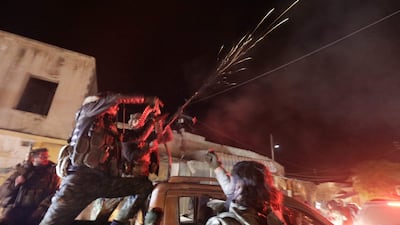Many across the Middle East will be apprehensive that just as one conflict appears to be subsiding in Lebanon, a supposedly frozen civil war in Syria has rapidly thawed. This week’s lightning offensive by anti-government rebels that routed government forces in north-west Syria is a sobering reminder that failing to comprehensively resolve conflicts often leaves a powder keg that can explode at any time.
Although many civilians who fled to Idlib after the Syrian government’s violent retaking of Aleppo in 2016 say they are happy that they can now return to their homes, reports of other civilian convoys fleeing the city – the site of so much suffering eight years ago as well as during the 2023 earthquake – will alarm many, particularly given that the rebel coalition has worrying links to extremism.
Hayat Tahrir Al Sham, which launched the offensive, was formerly aligned with Al Qaeda but says it split from the terrorist organisation in 2016. It consists of several militant factions, but in recent years has reportedly tried to distance itself from extremism. But this effort, according to the Centre for Strategic and International Studies, is more of a rebranding than a “genuine change in ideology”.
That government lines broke so quickly suggests that the armed forces were taken by surprise despite the months of preparation that would have gone into the rebel offensive. This highlights a key problem in ending Syria’s war once and for all: the lack of an agreed and robust political system able to oversee a territorially contiguous state whose writ runs to all parts of the country. As things stand, Syria remains fragmented, divided into zones of influence dominated either by state forces or militias of different stripes – all of which enjoy the support of various foreign powers.

Much of the Arab world’s reaction to the renewed fighting in Syria has focused on this problem. President Sheikh Mohamed held a phone call on Saturday with Syrian President Bashar Al Assad during which he emphasised the UAE's solidarity with the Syrian state, its support in combating terrorism and extremism as well as the need to support efforts aimed at preserving Syria’s unity and sovereignty. Similarly, Ayman Safadi, Jordan’s Minister of Foreign Affairs, said that his country backed Syria’s territorial integrity. Iraqi Prime Minister Mohammed Shia Al Sudani said that Syria’s security and stability were directly linked to Iraq’s national security.
On Sunday, the US, Britain, France and Germany issued a joint statement that said the current escalation “only underscores the urgent need for a Syrian-led political solution to the conflict”. Geir Pedersen, the UN’s special envoy for Syria, has called for a political process to implement Security Council resolution 2254, a unanimously adopted text from December 2015 that calls for a nationwide ceasefire, confidence-building measures and steps to address terrorism. They are right to do so.
Countries embroiled in the conflict, such as Russia and Turkey, should play their part in bringing it to an end. The alternative is to be invested an unending process of political and military involvement. No one is suggesting that a negotiated end to the war is going to be easy; there have been too many unsuccessful attempts to in the past – see the deadlocked state of the Astana Process, the trilateral forum led by Turkey, Russia and Iran. Nevertheless, what Syria’s people need and deserve is a genuine peace process.
Whether the events of this week turn out to be a game changer that leads to a political reordering in Syria remains to be seen, but what is clear is that accepting the status quo of a frozen conflict is not an option – if it ever was.


